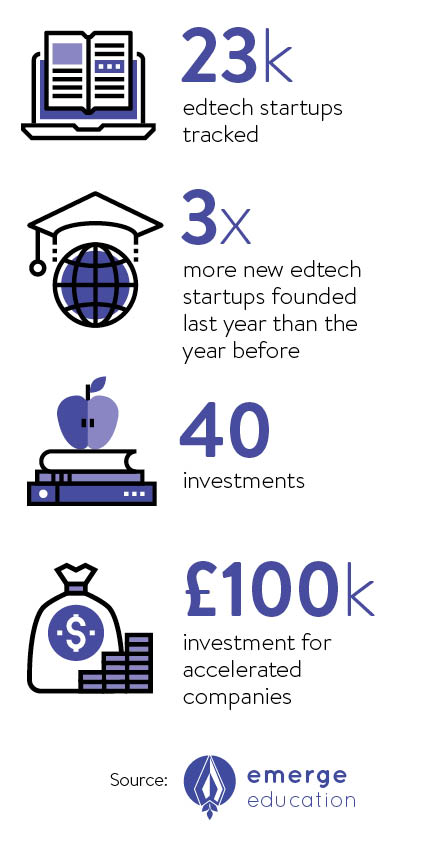Technology has the potential to decrease educational inequality, increase graduates’ job fitness and save schools money.
Only 3 per cent of global education spending is digital, however this component is growing twice as fast as the rest of the sector, according to IBIS Capital.
Thousands of startups are entering the edtech arena. Europe’s most active edtech seed investor, Emerge Education, tracks more than 23,000 such startups worldwide, with the number of newcomers increasing by 300 per cent last year.
In just over two years, Emerge Education has invested in more than 40 edtech startups. Backed by Oxford University Press, the world’s largest university press, Qtone, a leading Chinese education company, and angel investors, it provides startups with up to £100,000 of investment, and supports product testing and sales.
“We have spent the last two years convening the most influential education institutions, entrepreneurs and investors,” says Jan Matern, co-founder and chief executive at Emerge Education. “Startups from over 60 countries apply to join Emerge Education in order to access this community.”
 Emerge Education portfolio company Pi-Top is tackling the large technical skills gap in the workforce of tomorrow. Its devices are the pi-top, a laptop that you make yourself, and the plug-and-play pi-topCEED desktop, both based on the Raspberry Pi system. The combination of Pi-Top’s hardware and software make it possible for any teacher, regardless of their computer literacy, to deliver engaging lessons across science, technology, engineering and maths.
Emerge Education portfolio company Pi-Top is tackling the large technical skills gap in the workforce of tomorrow. Its devices are the pi-top, a laptop that you make yourself, and the plug-and-play pi-topCEED desktop, both based on the Raspberry Pi system. The combination of Pi-Top’s hardware and software make it possible for any teacher, regardless of their computer literacy, to deliver engaging lessons across science, technology, engineering and maths.
Pi-Top expanded in two years from operating out of a living room, to becoming a 25-person company selling computers in 70 countries.
“We work with schools and the education system to enhance what teachers already do,” says Jesse Lozano, co-founder and chief executive at Pi-Top. “Rather than expecting the education system to adapt to us, we work with well-known content providers and educators to create a new cost-effective platform that enhances current content.”
Meanwhile, Barcelona-based Emerge Education startup Boolino is addressing the issue of low child engagement in reading. This is a global problem, with some 5.2 million adults in the UK functionally illiterate, according to the Literacy Trust.
[embed_related]
Boolino focuses on developing young reading habits and skills. On its website, a large group of expert bloggers, booksellers, librarians and teachers help more than 250,000 families and children find new books to read.
Sven Huber, a former Bertelsmann executive who founded Boolino in 2011, explains: “Our mission is to improve children’s learning capabilities around the world, helping them to become enthusiastic readers. We offer great growth across the sector and work actively with all parts of the value chain.”
Among the company’s offerings is Boolino Book Box, a tool that combines reading, games and crafting activities. Drawing from new funding, Boolino recently acquired Fiction Express, an interactive literacy resource used in 500 UK schools. It allows primary school pupils to take part in the story-writing process, changing the plot while the author is writing it.
The rise in educational technology startups is impressive and they are tackling major issues. Mr Matern says Emerge Education has “bet its existence” on the sector, and its portfolio companies already sell to nearly a half of secondary schools and a fifth of primaries in the UK.
The new wave of edtech businesses is here and it’s time to be involved.
To find out more about the companies in this article visit www.emerge.education, www.pi-top.com and www.boolino.co.uk






